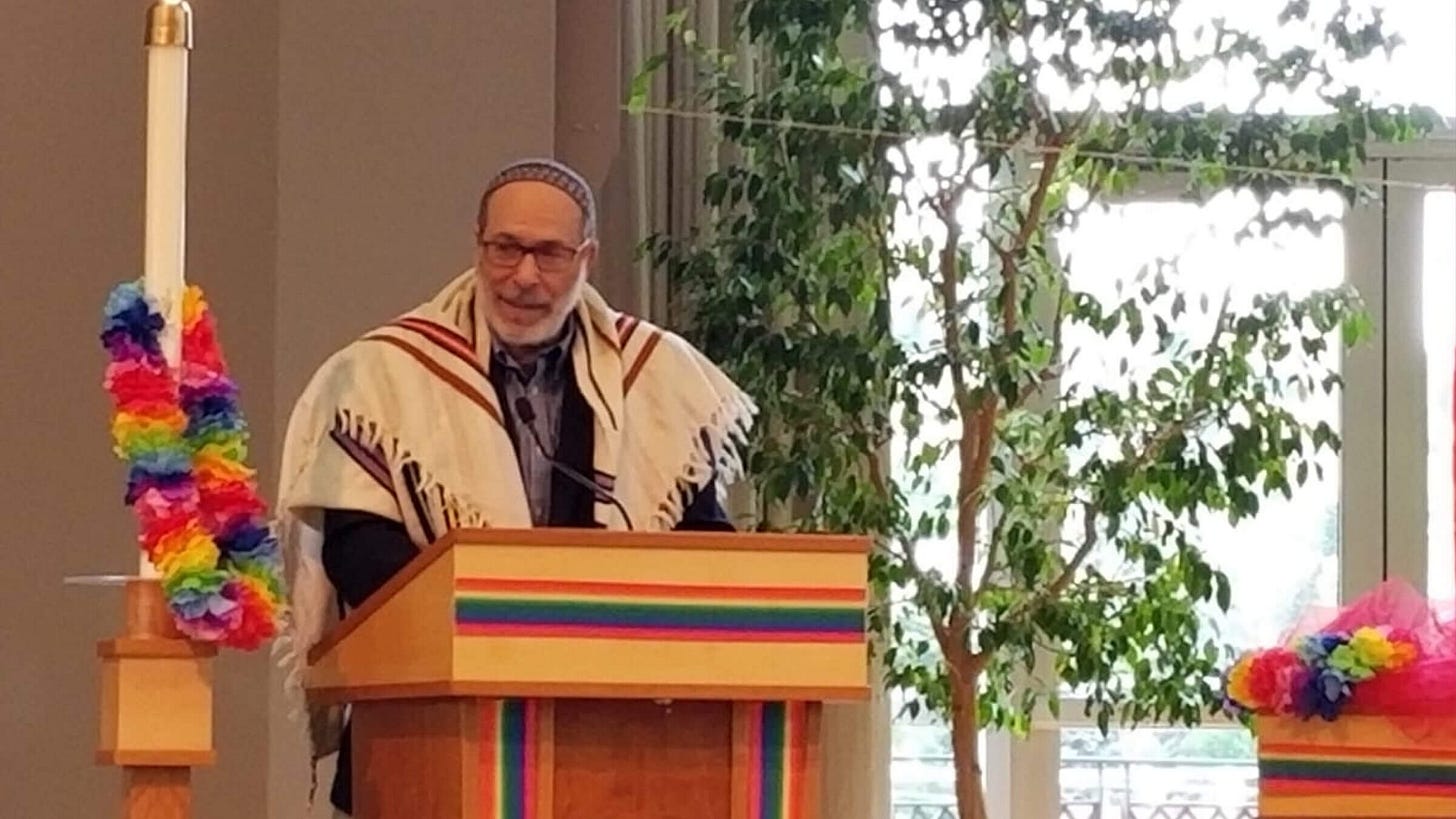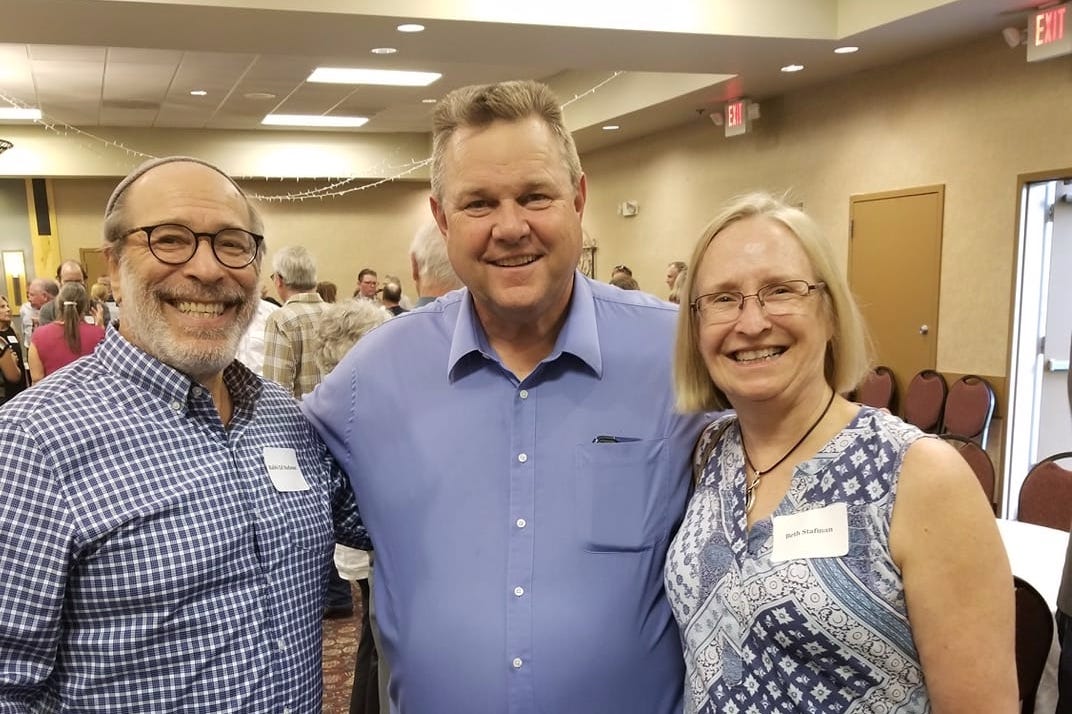Rep. Ed Stafman ties his cancelled invocation to Christian nationalism
Plus: Mary Kate Teske's sweet bluegrass ode to getting stoned by the river.
Welcome to Big Sky Chat House— a newsletter about movers and shakers in Montana.
If you found this email in your Promotions folder, please move it to your Primary inbox. That will make it easier to find down the road, and teach Gmail to send it to other subscribers’ Primary inboxes as well.
Montana Song of the Week
Mary Kate Teske - “June Rise”
In her brand-new (and rather timely) single “June Rise,” the Billings-based musician, writer and photographer Mary Kate Teske sends up a gorgeous and light-hearted ode to watching a river roar by and wishing the current would be calm enough for swimming.
Teske’s stunning, crystal-clear voice serves as the focal point here, but her lively band adds rich color and warmth; the lurching fiddle solo is particularly exuberant.
Teske keeps up a steady stream of reflections and meditations on the state of the river even as she starts to get antsy, lamenting the violent June run-off and yearning for mellower waters. Soon enough, however, she admits that “June’s better spent better anyway stoned under the shade of a tree.” That line puts a smile on my face: a playful reminder to savor the moment, no matter whether it’s safe to jump in or not.
Rabbi emeritus and state rep. Ed Stafman discusses his cancelled invocation and Christian nationalism in the Montana Capitol
In the final week of the 2023 Legislature, as the explosive drama surrounding the censure of Rep. Zooey Zephyr consumed lawmakers’ and citizens’ attention, another controversy involving the Republican Speaker of the House, Matt Regier, boiled in the background.
On May 1, Democratic Representative and retired rabbi Ed Stafman was set to deliver the daily invocation before his peers; he also had given a separate invocation earlier in the session.
At the last moment, however, Stafman found out the invocation had been cancelled. Shortly thereafter, the Montana Jewish Project published a public letter to Regier seeking an explanation. Met with silence, the group began to suspect nefarious intent.
On May 23, Regier published an op-ed in the Helena Independent Record. In it, he sought to dispel any suspicion of anti-semitism by citing his support for the current, right-wing Israeli government.
As a Jewish person myself, I’ve been following the back-and-forth closely, and have been keen to hear Rep. Stafman’s side of the story. Read on to learn more about his faith, and why he thinks that his peers’ alleged embrace of Christian nationalism resulted in the cancellation of his invocation.
Max: What was your favorite part of serving as the rabbi of the Bozeman synagogue Beth Sholom?
Rep. Ed Stafman: There are many, but I think probably the interfaith work that I had the opportunity to do, and enriching my own spiritual life by learning from others in other faith traditions. Most of the divides in the religious world are mainly about language and not about ideas. Many of my best friends are clergy in other faith traditions here in Bozeman.
I also loved doing weddings and other life celebrations. I still do those. I did a bar mitzvah just a couple of weeks ago. I've got two wedding couples I'm working with right now.
Is there overlap between your work as a rabbi and your work as a legislator?
Yes, very much so. My values that I bring to the legislature come from the values that I take from my Jewish life and my spiritual life.
For example, there was a bill this session [Senate Bill 458] that defines sex as male and female only, and excludes people who don't fit into one of those categories. The argument made by the proponents of this bill was that the law uses the terms “male” and “female,” or “man” and “woman” or “sex” all the time. And we should have a definition.
Well, as it turns out, the rabbis in the Talmud faced that same question because they were interested in applying the Jewish law at the time to people who may not have fit squarely into one of those categories. And in their deciphering they came up with seven genders: male and female are two. There are Hebrew words for the other five. They roughly translate to “androgynous,” and different kinds of trans: men who become women are different than women who become men, for example. And non-binary. [Note: some sources say the Talmud includes reference to eight genders]
These rabbis weren't necessarily interested in the social justice message that so many advocates are today. But they were interested in how to apply the law in a community that has people who don't necessarily fit [in the two binary categories]. We want to be sure everybody's included, so that nobody in the community is left behind in our understanding. So there was no particular judgements about these other categories.
I also have the more classical progressive perspective of today, of equality for all genders, but I'm most influenced by this notion that it's important that we include everybody and that not everybody fits in these binary categories.
A lot of these people thought this was a brand new thing that we're grappling with for the first time in history. And having done all this study, I understand that this is not at all a new thing. This was in the second to fifth century that the rabbis dealt with these issues and came up with these solutions.
[In terms of the overlap between rabbi and lawmaker], as a rabbi you really care about relationships. And in the legislature, relationships are also important, but it's actually in some ways a little harder because relationships in the legislature tend to be much more transactional.
One of the real areas of cognitive dissonance for me is that there are quite a few Republican lawmakers who I genuinely like, and if we lived closer, I'm sure we’d be good friends. And yet they vote, many times, in very terrible ways.
And they know it. And in some ways I feel really sorry for them because they vote against their conscience; maybe a third or a half who are faced with the choice of, “I can only buck my party so many times before they punish me and take away my committee assignments or run a far-right person against me in a primary.” I've just seen their anguish.
Let’s talk about your invocation—how did you find out it had been cancelled?
The legislature meets at one o'clock as a body every day. I walked in at 12:30 or so and Representative Binkley, who organizes the invocations, told me. She's a friend and a very good, decent person. And she came to me and said, “I'm really sorry, but you've been cancelled,” or words to that effect, and you won't be doing the invocation today. You could just tell that she was almost embarrassed about it. It obviously had come from higher up: presumably the Speaker [Matt Regier], but either the Speaker or the Majority Leader [Sue Vinton].
What was your reaction? How did that feel?
Well, I was of two minds: one is I felt this was just another symptom of a group that's dominated by Christian nationalists, and that because I'm a rabbi my invocation would clearly not be a Christian invocation. [But] invocations shouldn't be any denomination: they shouldn't be Christian, they shouldn't be Jewish.
When you do an invocation, the idea is you're praying on behalf of the entire body. It should never be in Jesus's name, for example.
If you want to invoke God, you say, you know, “In all of your holy names” or something like that. Public prayer is an art and it's not an art that's carried out there because these people who do it by and large are not trained in it. And so they just bring their own very Christian beliefs. And sometimes you feel that if you're not Christian, you're really excluded. I've had a number of people tell me how awkward it feels to them.
It's not only the words, but for example, it's always “bow our heads.” Well, that's a Christian thing. Jews don't bow their heads in prayer. And neither do Native Americans, but they're asked to. And so it's not just the words, but also the whole style.
At the same time I didn't want to make it into a big issue because I felt that of all of the indignities that so many Montanans have suffered from the majority in this session, perhaps this is one of the least.
The fact that I'd given [an invocation] early in the session is sort of irrelevant because many people give it two and three times.
I had been signed up months before and I'd been bumped a couple of times. What happened was Representative Carter from Missoula had given an invocation that, let's just say it was very secular in nature, and I think some Republicans took it as kind of mocking of the Christian stuff.
I don't know that, but that's my guess. After that, all Democrats were banned from giving invocations. I happened to be on the schedule a week or two after that, and I was cancelled, but I think I was cancelled because I was a Democrat. And then a week or two later, they said, “Well, we didn't really mean it as a permanent ban; it was just a temporary ban as retribution for what Representative Carter had done.” So I was put back on the schedule for another day, and then I was bumped from that as well. And I don't remember what the reason was, because at the same time I was given another date later on, which was this last date.
Christian nationalism is a huge problem up there and it manifests in a lot of ways. So all of the anti-abortion legislation, all of the anti-LGBT stuff comes out of this particular brand of Christianity, this right-wing Christianity. It's as much cultural as it is Christian, or maybe more cultural than it is Christian. It’s the belief that this is a Christian nation and that our laws should reflect that. And that they have the right to impose these Christian values on everybody else.
And I'm using the word “Christian” very loosely here because I don't actually think they're Christian values, but that's how they think of them. That's the disease. There are many symptoms of that disease. Some of them are anti-LGBT laws. Some of them are the anti-abortion laws, some of them are the vaccine laws.
What happened to Zooey Zephyr is a symptom of that. And what happened to me, to a lesser extent, is also a symptom of that.
Do you feel like what happened to you was a manifestation of anti-Semitism?
I didn't push this whatsoever, but what happened after I was denied the invocation is that a lot of Jews from all over the state started writing letters complaining to the Speaker and demanding an explanation. And none was forthcoming until he published an op-ed in the Helena newspaper saying that he's not an anti-Semite [because] he loves Israel.
This was my next question for you.
And so, does making one a backer of a right-wing government in Israel mean that you're not an anti-Semite? Or if you respect right-wing Judaism, like the Chabad offers.
The governor, for example, would point to the fact that he declared the founder of Chabad’s birthday as a special day in Montana. Does that remove the claim of anti-semitism? It's tricky, right?
I think we use these terms very freely—both “Christian nationalism” and “anti-Semitism”—and they don't always line up so well with “Does that mean they hate all Jews?” Or “Does that mean that all Christians are like this?” So I don't like to use those terms in this context.
You want to talk about the Nazi party and their distribution of flyers, that's clearly anti-Semitism. I think we could all agree on that. This is a little more nuanced.
Have you had opportunities to talk to lawmakers across the aisle about this in private, and if so, what kind of reactions do you get?
I didn't actually because this happened like two days before the session ended. And it was hectic city at that point. But that said, the Freedom Caucus folks have treated me like that all session long. What I would call othering, making it known that you're not welcome there.
How did that manifest?
It's hard to explain—you know it when you see it.
I think other folks on the Republican side are actually embarrassed by that conduct by their colleagues, but they also don't want to call out their colleagues.
Before we wrap up, I have a sticky question for you: As a Jewish person myself, and particularly as a Jewish person whose relatives were murdered by Nazis, I struggle to find the line between rhetoric and action that feels threatening, versus the rhetoric and action that actually threatens me and my well-being.
I'm thinking of Montana’s US Representative Rosendale posing for photos with neo-Nazis (which he claims he did unknowingly), or Speaker Regier's father, State Senator Keith Regier, invoking Nazi propagandist Joseph Goebbels on the Senate floor, or Governor Gianforte appointing Jeremy Carl, who espouses profoundly racist sentiments, to the board of Humanities Montana. What do you make of that distinction?
I think we could look for an example in 1930’s Germany, where various things happened to not just Jews but other communities that were a furtherance of anti-semitism. Canceling my invocation is hardly a predecessor to a serious threat. [But] at the same time, it's a little bit like the frog in the boiling water: you put the frog in the cold water and you turn up the heat, and it's getting a little bit warmer and it's getting a little bit warm. And then the next thing you know, it’s a boiled frog. All of these things contribute to a more hostile place. And by the way, I don't think it's at all limited to Montana. This is a national phenomenon.
I can't say at this point in time that we're highly threatened, but on the other hand, 1930’s Germany taught us a lesson about vigilance. And that it's the little things that add up and add up and add up, and then before you know it, Kristallnacht happens. Of course we had that incident in Whitefish just a few years ago where Jews were targeted and eventually the two rabbis there had to get security systems for their homes because of the constant threats. It's this growing trend and it varies from place to place within the state and within the country. I guess my advice would be, don't panic, but stay vigilant.
This conversation has been lightly edited for length and clarity.
Thanks so much for being here. In the meantime, you can always reach me via email, the comment section below, or on the Elon Machine, @SavageLevenson.




